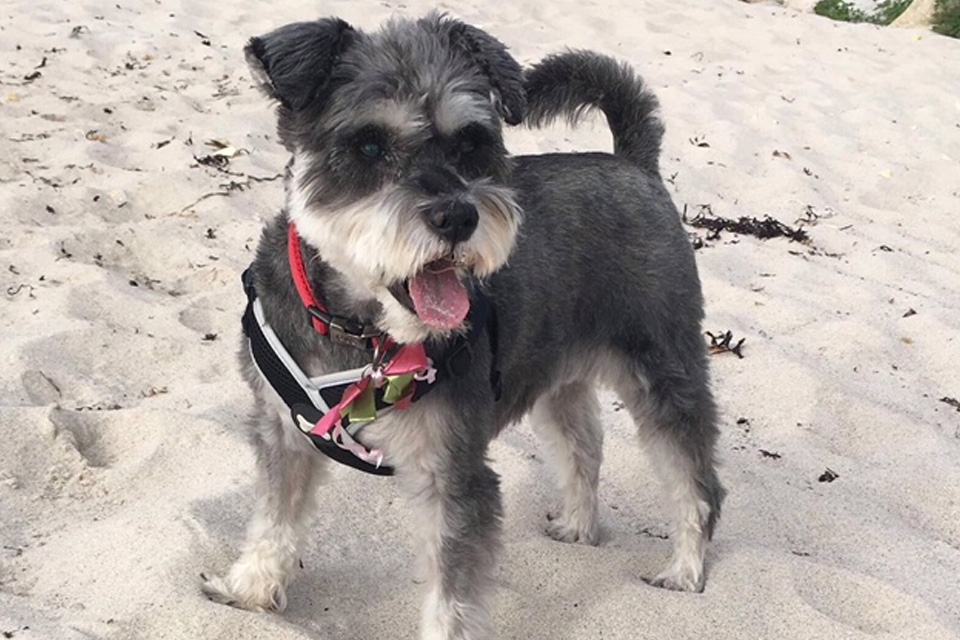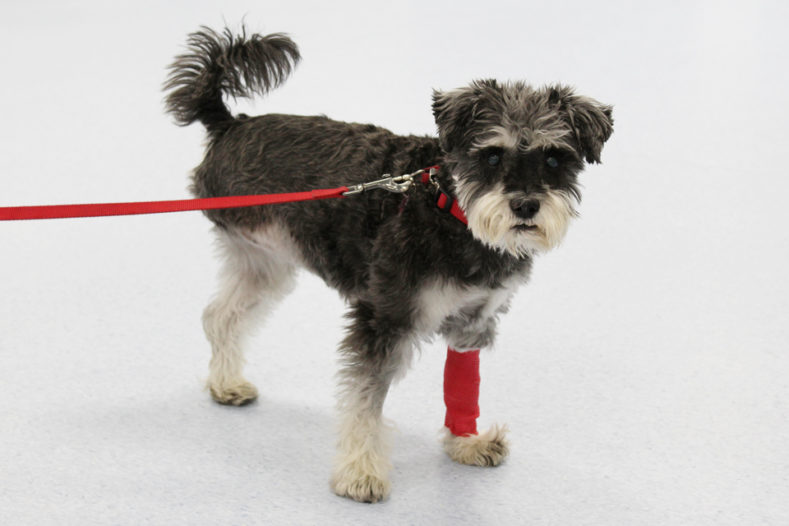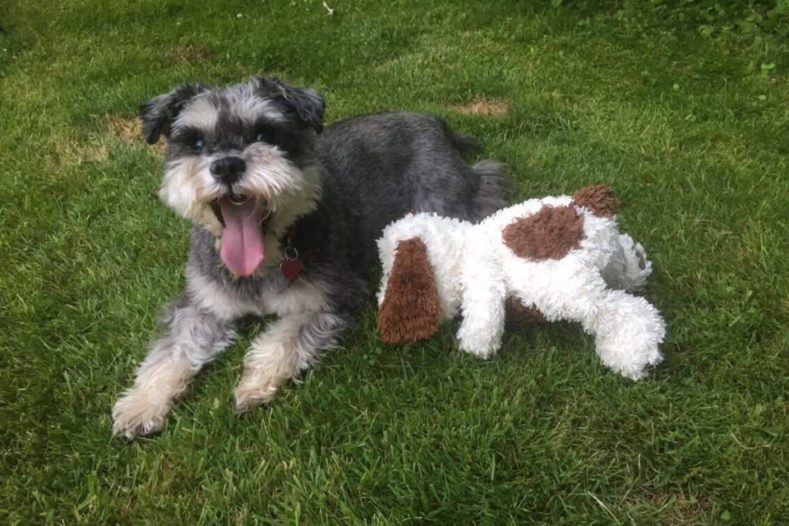Casey’s story – metastatic mast cell tumour

Casey is being treated at Fitzpatrick Referrals Oncology and Soft Tissue for metastatic mast cell tumour.
Casey is a 10-year-old Miniature Schnauzer. In June 2017, Casey’s groomer discovered a diffuse 4cm swelling in her right metatarsal region. A fine needle aspirate of the mass by her family vet confirmed it was a mast cell tumour. On clinical examination, her right popliteal lymph node was moderately enlarged but Casey was otherwise bright, alert and leading a happy normal life.
Casey was referred to Fitzpatrick Referrals Oncology and Soft Tissue to discuss the diagnosis and treatment options available for mast cell tumours. The biological behaviour of canine mast cell tumours was discussed including the importance of staging to rule out metastasis to the local lymph nodes, the liver and the spleen. A CT scan of Casey’s thorax, abdomen and right hind limb were performed in August both to determine resectability of the metatarsal mass, and for tumour staging. Ultrasound-guided fine-needle aspirates of her liver and spleen showed no evidence of metastatic spread to these organs but unfortunately, mast cells were present in aspirates of the popliteal lymph node.
One treatment choice for canine metastatic mast cell tumours, with no evidence of systemic metastases, is wide surgical removal with regional lymph node excision, plus adjuvant chemotherapy. The CT scan demonstrated however that the mast cell tumour was infiltrating diffusely between the soft tissue structures of the plantar metatarsals, including extending between the bones making a wide surgical excision not possible.
Therefore, the two options presented to Casey’s family were a limb-sparing procedure with a mid-tibial amputation prosthesis or a right hind limb amputation. The possibility of microscopic disease existing elsewhere would mean adjuvant chemotherapy would be recommended postoperatively. After a discussion of the options, Casey’s family made the decision to go ahead with a full limb amputation and follow with chemotherapy.
Casey returned to Fitzpatrick Referrals for a hindquarter amputation (including popliteal lymph node removal) with surgeon Professor Nick Bacon. Casey’s surgical procedure went well, without complications and she recovered rapidly. She was up and walking in the hospital garden within 12 hours of her procedure. Casey was reunited with her family four days after surgery and her family reported that she was playful and energetic, and has never let her three legs stop her from being involved in all the family’s normal activities.

Casey on one of her visits to Fitzpatrick Referrals Oncology and Soft Tissue.
The amputation allowed the mast cell tumour to be removed with clean margins and was diagnosed as a grade ll (Patnaik) / low grade (Kiupel). Histopathology on the popliteal lymph node confirmed nodal metastasis. Vinblastine was administered intravenously every week for four treatments, followed by four fortnightly treatments. Upon finishing the chemotherapy protocol, Casey was re-staged with an abdominal ultrasound and repeated fine needle aspirates of her liver and spleen, which showed no evidence of mast cell disease.
Casey is always bright, bouncy and wagging her tail during her visits. She is a very sweet and gentle-natured girl. Her family always report that she is happy and comfortable at home and feel she has a very good quality of life. She has been on holiday with her family and continues to enjoy games with her toys.
Published work looking at the outcome of grade ll tumours with confirmed nodal metastasis would indicate an average survival of over five years following removal of the primary tumour, the metastatic lymph node, and adjuvant chemotherapy, so we hope Casey will live a happy and comfortable life for a long time yet.

Casey relaxing in the garden at home.
Casey’s family said:
Capturing the essence of Casey in words is a challenge. She is loyal, gentle, soppy and at the same time stubborn, mischievous and clueless. Above all, she is utterly, utterly lovable.
At 10 years old, Casey defies age and maturity; she continues to play with her soft toys, asks us to play chase and barks at cats, but usually behind the safety of a window. In the garden, Casey will be the one being pursued! She has grown up in a family with teenage twins and has never been short of cuddles, pampering and play.
Throughout Casey’s cancer journey, we have been extremely lucky. From when we first noticed the swollen leg, to her first steroids, to losing her leg, to chemotherapy and now her last scan, Casey has remained entirely unchanged by her experience. She has shown no pain or discomfort (cone-of-shame excepting) and seems completely oblivious to what is going on. If anything, cancer has only made Casey happier; she now gets peanut-butter covered pills and has exciting days out to Fitzpatrick Referrals. She may be a bit clumsier than usual, but she is still a running, jumping, playful lunatic who greets everyone by rolling on her back for tickles.
All the staff at Fitzpatrick Referrals have been absolutely lovely, to Casey and all of the family. Their professional and compassionate approach has been a privilege to experience. For all her outpatient treatments, big or small, Casey stayed the whole day at Fitzpatrick Referrals while her Mum was at work. In the early mornings, Casey walked off with her nurse, tail wagging with not a second look at Mum. In the evening when Mum arrived, she could hardly tear herself away from the nurse and reception staff who showed her such love. A thank you from all the Cockle-Hearne’s (canine and human) to Nick Bacon and all the staff at Fitzpatrick Referrals for making this unwelcome journey so positive and uplifting.




